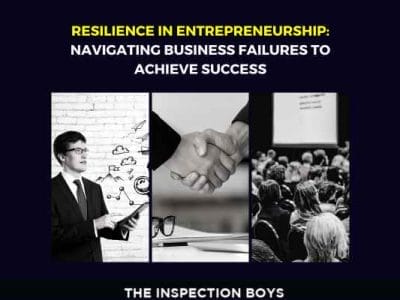Experiencing business failure is more common than one might think. Astonishingly, statistics suggest that nearly 80% of new businesses don’t make it past the five-year mark. But it’s essential to remember that a setback in business doesn’t equate to an irreversible end. Every failure carries lessons that can shape a resilient entrepreneur.
Here’s a roadmap to navigating business failures:
1. Embrace Your Emotions:
Failure, naturally, stirs a plethora of emotions—be it sadness, anger, or frustration. Acknowledging these feelings is the first step. Give yourself the grace to grieve, recognizing that it’s a part of the healing and learning process.
2. Seek Trusted Counsel:
Lean on a trusted friend, family member, or mentor during these challenging times. These conversations can provide clarity, encouragement, and sometimes, a fresh perspective on the next steps.
3. Delve into the “Why”:
After the initial emotional processing, assess the failure’s root causes. Such retrospection illuminates the areas requiring change or improvement.
4. Chart a Recovery Path:
Using your failure analysis as a foundation, craft a strategic plan. Define clear objectives for your next venture and delineate actionable steps to achieve them.
5. Persistence is Key:
While recovering from a business downfall is daunting, perseverance will be your most valuable asset. Continuously evolve, learn, and strive for your dreams, even in the face of adversity.
Further Insights for a Stronger Comeback:
1. Prioritize Self-care:
Your well-being—both physical and mental—is paramount. Engage in healthy routines, including a balanced diet, adequate sleep, and regular exercise. Surrounding yourself with loved ones and indulging in hobbies can also provide therapeutic relief.
2. Seek Assistance When Needed:
A vast community of entrepreneurs, mentors, and support groups understands the intricacies of business failures. Never hesitate to tap into this network for guidance and support.
3. Evolve Through Errors:
Every error carries a lesson. Extracting these lessons ensures that past mistakes aren’t future obstacles.
4. Cultivate Patience:
Recovery and success aren’t instantaneous. Understand that rebuilding might be a slow process. But with unwavering determination and hard work, success is attainable.
Success Stories Post Business Failures:
Several industry moguls have faced setbacks before cementing their names in the annals of business success.
Steve Jobs: Once ousted from Apple in 1985, he went on to create NeXT. This venture was eventually integrated into Apple, leading to Jobs’ triumphant return and Apple’s subsequent boom.
Oprah Winfrey: Dismissed from her position as a news anchor in the 1980s, she channeled her passion and resilience, birthing one of the most iconic talk shows globally.
Bill Gates: Having left Harvard to spearhead Microsoft, Gates encountered his share of challenges. Their initial product, Altair BASIC, didn’t catch on. But, learning and adapting, Gates led the development of MS-DOS, revolutionizing personal computing.
Such tales are a testament to the fact that with resilience, adaptability, and perseverance, one can turn business failures into stepping stones for unparalleled success. So, if you’re amidst a business setback, harness the lessons, fuel your determination, and remember, your story of success might just be the next beacon of inspiration for budding entrepreneurs.


 Defending Your Home Against Drywood Termites
Defending Your Home Against Drywood Termites